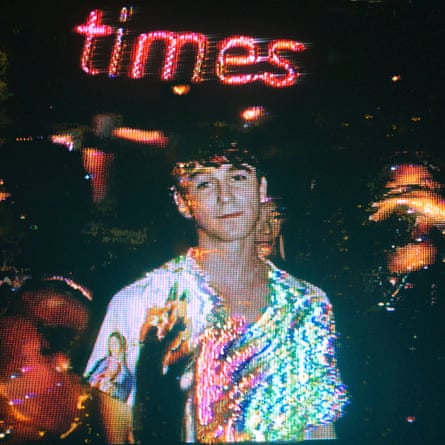Recently, the various social media feeds of singer-songwriter-producer SG Lewis have offered up everything from tutorials on recording techniques to live streams during which Lewis displays his ability to down cans of lager in one. In between, comes evidence of Lewis’s obsession with disco, for which he has evidently fallen hard.
There are glowing recommendations for Tim Lawrence’s magisterial book Love Saves the Day: A History of American Dance Culture 1970-79. There are videos of the British producer flicking through disco 12-inches in a secondhand record shop and clips of him interviewing Alex Rosner, the genial, pipe-smoking designer of the sound systems at legendary 70s NY clubs the Loft and the Gallery, whose voice appears over tinkling synth arpeggios on Times’s brief instrumental Rosner’s Interlude. And there are screenshots of messages from Nile Rogers, who makes an appearance on his single One More. Indeed, the original title of Lewis’s album was the Chic-derived Good Times, before the adjective was lopped off, presumably when it became apparent that calling an album Good Times would seem unnecessarily sarcastic given the current state of the world.

You could say there’s something horribly ironic about releasing an album informed by disco’s communal hedonism in early 2021, regardless of its name. There’s certainly something a little weird about hearing Lewis’s description of Times as “an ode to the present moment and the finite chances we have to celebrate it”, when the present moment feels both interminable and numbingly repetitious. And yet, Times also arrives at a bizarrely opportune point: disco is having one of its regular moments, manifested everywhere from Dua Lipa’s Future Nostalgia to Victoria Monét’s Experience – both featuring Lewis – as well as Doja Cat’s Say So, the video for BTS’s Dynamite, and a plethora of thinkpieces ranging in tone from celebratory to hand-wringing. If Lewis’s belief that his album might soundtrack a summer of post-lockdown festivals and raves seems optimistic, the fact that its natural environment remains shut for the foreseeable clearly isn’t a barrier to its potential success.
Times’s contents underline what Experience already suggested: whether it’s down to his immersion in the original era or a natural affinity for making it, Lewis is really skilled at producing disco-infused pop-house. Instead of overloading tracks with obvious, high-camp disco signifiers, his talent lies in subtle touches.
The lovely backing of Time, reminiscent of late-90s classic Music Sounds Better With You, is woven with a beautifully muted orchestral arrangement and understated snatches of vocal samples (taken, it turns out, from Dennis Edwards’s Don’t Look Any Further); the largely instrumental Back to Earth is decorated with a restrained but nagging woodwind motif. The lyrics of One More key into a longstanding tradition of bittersweet songs about fleeting disco romance, and convey the sense that Lewis knows the dancefloor intimately. For all that it might be aimed at the charts and the Radio 1 A-list, Times’s tracks carry a distinct tang of reality. The soaring analogue synth tones of Chemicals, courtesy of the Neptunes’s Chad Hugo, underline the song’s depiction of a party entering full chaotic swing; Canadian singer Rhye’s blurred-but-elated vocal on Time captures the fuzzy unreality of dawn after a night out.
Lewis is less assured when he moves away from his disco blueprint. There’s nothing wrong exactly with the ballady Heartbreak on the Dancefloor or the more straightforwardly pop-facing Impact, featuring Robyn, but they feel less distinguished than the tracks that surround them. And his own vocals are noticeably less distinctive than those of his guests, a state of affairs amplified by the fact that he seems to lack confidence in them: whenever he takes to the microphone, he seems to crank up the Auto-Tune.
But those are problems you sense he might crack in time. Lewis has talked about the contents of his debut album undergoing a certain circumstantial repurposing as global events overtook them: intended to create sweaty small-hours euphoria, they currently have to function as music that transports the listener from their surroundings, however temporarily. You can see how the slowly building electronics of All We Have or the Syndrum explosions of Feed the Fire might be potentiated by being heard at high volume in the middle of a crowd but, equally, they’re strong enough songs to withstand being taken out of context, to add a moment of sparkly exhilaration to a Friday evening that involves nothing more thrilling than turning up Spotify in the kitchen.
This week Alexis listened to
Exum: Dark Kept Secret
Neon-haired former professional American footballer turns his hand to gently psychedelic androgynous pop, complete with dance-like-no-one-is-watching choreography. Whatever next?

Comments (…)
Sign in or create your Guardian account to join the discussion